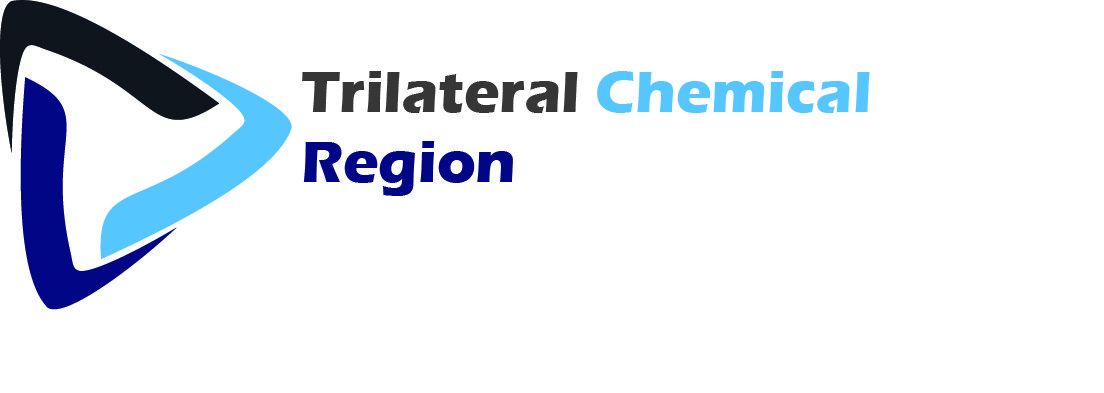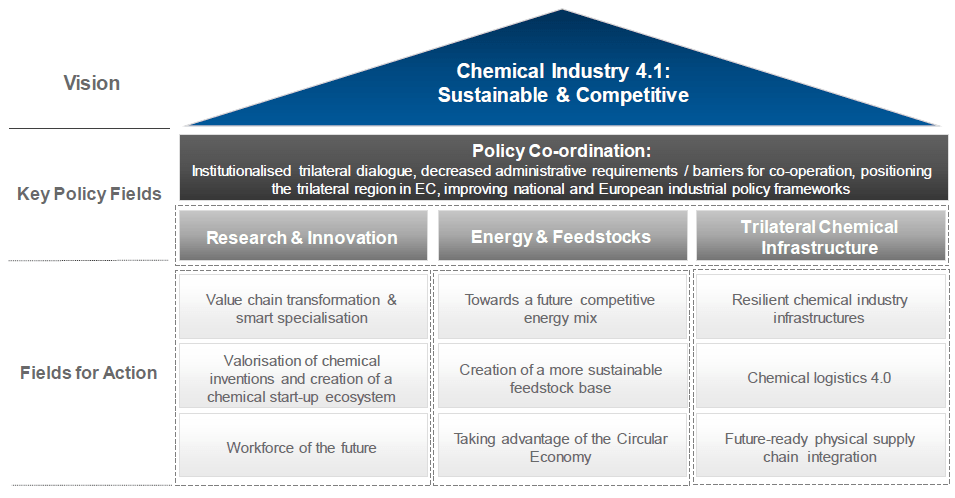Policy Fields
Vision 2030: The world’s engine for the transition towards a sustainable and competitivechemical industry
To emerge as an industry leader region in the future global chemical industry landscape, three key policy fields (vertical) and one horizontal aspect will guide the common actions of the trilateral chemical industry. These have been supplemented by specific fields for actions, which address more detailed the most critical issues that need to be matched with concrete measures.
Key policy field 1: Research & Innovation (R&D&I)
The policy field of ‘Research & Innovation’, with its measures and fields for action, shall contribute to reaching the following strategic objectives:
1. Improve the strategic targeting and support of trilateral R&D&I activities for the most relevant innovation opportunities.
2. Strengthen joint action in the field of R&D&I to allow for greater scale and specialization.
3. Increase the value capture from joint R&D&I in the trilateral region.
4. Position the trilateral region as a global hub for chemical industry start-ups.
5. Prepare the workforce of the future for the trilateral chemical industry.
Key policy field 2: Energy and Feedstocks
The key policy field ‘Energy & Feedstocks’, with its measures and fields for action, has the following strategic objectives:
1. Ensure competitive energy and feedstock prices.
2. Strengthen trilateral co-operation regarding EU climate and energy policy.
3. Develop a coherent and predictable regulatory framework for energy and climate policy to assure and regain investment confidence.
4. Create attractive conditions for the use of alternative feedstocks to prepare for the transformation towards new value chains.
5. Fully exploit the opportunities of the Circular Economy, including reducing overlapping costs through other European instruments.
Key policy field 3: Trilateral Chemical Infrastructure
The policy field ‘Trilateral Chemical Infrastructure’ shall contribute to reaching the following strategic objectives:
1. Increase the resilience of the trilateral transportation infrastructure through coordinated planning involving the relevant stakeholders.
2. Upgrade logistics to the next level by capitalizing on the opportunities of digitization and by facilitating transition to combined transport.
3. Enable future investments in the trilateral Verbund by reserving sufficient space for key infra-structures and paving the way for concrete projects (e.g. by developing a vision for pipelines in the trilateral region, improving capacity for rail freight and inland waterway transport).
Horizontal key policy field: policy co-ordination
Although increased co-operation across borders can be observed, there are still regulatory, financial and administrative hurdles experienced by companies and research institutions in the trilateral region that represent obstacles to innovation and research undertakings (e.g. cross-border financing or different regulations regarding energy, climate or waste). These obstacles need to be tackled jointly to allow for more intensive and streamlined trilateral collaborations in relation to the key policy fields.
Given this situation, the horizontal policy field ‘Policy Co-ordination’, pursues following the strategic objectives:
1. Establish well-coordinated planning for a streamlined implementation of the intended measures.
2. Reduce administrative obstacles to enable more intensified trilateral collaborations.
3. Improve industrial policy frameworks for a more investment-friendly climate.

